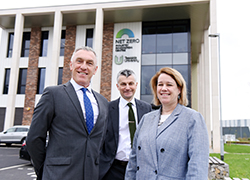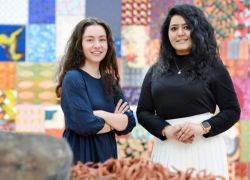Teesside’s Vice-Chancellor hits out at ‘top-up’ fees
The Vice-Chancellor of the University of Teesside, Professor Derek Fraser, today spoke of the very real commitment, dedication and, in many cases sacrifice, that students graduating this week had made and hit out at calls made by some other universities for ‘top-up’ fees.
Speaking today (Nov 21, 2000) at the start of a week of Academic Award Ceremonies at Middlesbrough Town Hall, Professor Fraser said the University of Teesside had won widespread recognition for the work it is doing to widen participation.
"In the recent higher education national performance indicators the University of Teesside was recognised as one of the most successful in the country for attracting students from diverse educational and social backgrounds," said Professor Fraser.
"It is because of that commitment to widening opportunity that the Board of Governors, our academic staff and our Students' Union are so firmly opposed to the introduction of so-called top up fees.
"I am convinced that to increase the financial burden on students will inhibit access from the very groups which we, and the government, are seeking to attract into higher education."
Professor Fraser described the last academic year as "one of the most successful years in our history" and said recent successes included: 1)achieving the best external quality ratings in the University's history 2)gaining Investors in People Status for the whole University 3)the opening by the Secretary of State for Health of our new Centuria Building 4)completion of the new Centre for Enterprise to support work with the business community 5)extending the University of Teesside Partnership to include the sixth form college sector 6)and successfully bidding for additional student places and funds to support the enterprise agenda.
"All these things though have only one purpose and that is to support and enhance the student experience here at Teesside," said Professor Fraser.
Looking to the next generation of students, Professor Fraser signalled the importance of programmes such as the Meteor Programme, which involves University students working with young people in local primary schools and the children participating in Summer Schools and other activities in the University. "Through Meteor and similar programmes we work in partnership to raise aspirations and extend opportunity," said Professor Fraser, who added that that it was with immense pride that some Meteor children and University staff met the Prime Minister and members of the Cabinet in the Spring in Downing Street. "I believe that such a recognition of the work that we are doing to widen participation raised the spirits of the whole University community.
The Vice-Chancellor ended his address to graduates and guests by placing on record his appreciation of the staff of the University and congratuatling students on their achievements and wishing them every success in the future.
 International partnership signed with prestigious American
...
International partnership signed with prestigious American
... Teesside University academics join prestigious network of
...
Teesside University academics join prestigious network of
... Curatorial studies culminating with international art
...
Curatorial studies culminating with international art
...